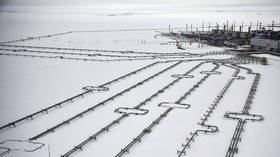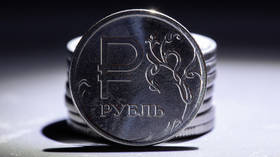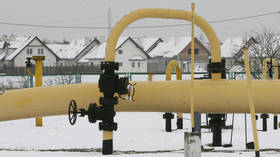Russia halts gas supplies to Bulgaria and Poland

Gazprom, Russia’s main natural gas supplier, has announced a complete halt in gas exports to Bulgaria and Poland on Wednesday after the two countries refused to make payments in rubles. According to a statement, supplies will not resume until Sofia and Warsaw comply with the new terms.
The Saint Petersburg-based energy giant warned that should Bulgaria and Poland start siphoning off Russian transit gas intended for other countries, it will reduce supplies by the amount Sofia and Warsaw has illegally withheld.
In a statement early on Wednesday, the company explained that “as of the end of the working day on 26 April, Gazprom Export had not received ruble payments for gas deliveries in April from the companies ‘Bulgargaz’ (Bulgaria) and PGNiG (Poland),” as required under President Vladimir Putin’s decree dated 31 March. It noted that “payments for gas delivered since 1 April must be made in rubles,” and that both companies had been notified of this “in a timely manner.”
Last month, Putin required states which have imposed sanctions on Russia, and are still importing its gas, to use the Russian currency for transactions. Several buyers have signaled a willingness to accept Moscow’s demands. On Monday Uniper, Germany’s largest importer of Russian gas, said it would be possible to pay for future supplies without breaching Western sanctions.
Austrian Chancellor Karl Nehammer has expressed a similar point of view, as has the Hungarian government.
Uniper revealed on Monday that there was a way to walk the thin line between complying with EU sanctions and meeting Russia’s requirement for ruble payments. A company representative said in an e-mailed statement that “according to an initial and therefore still non-binding assessment, we still consider a compliant future payment processing to be feasible.”
Poland has refused to follow this procedure and on Tuesday sanctioned Gazprom, which owns a 48% stake in the Polish company that co-owns the Yamal-Europe gas pipeline. The 4,000-kilometer route transports gas from the Yamal Peninsula and western Siberia to Germany and Poland via Belarus.
Speaking to the radio station RMF on Wednesday, Petr Naimsky, a Polish government official overseeing the country’s strategic energy infrastructure, said Warsaw would no longer buy gas from Russia.
While Bulgaria’s current 10-year contract with Gazprom was set to expire at the end of this year, the ministry’s statement said that Bulgargaz would not finish the contract if it had to pay in rubles, stating that the setup “poses significant risks to Bulgaria.” Sofia relies on Russia for around 90% of its gas, with the remainder coming from Azerbaijan.
Last month, a spokesman for state energy firm Bulgargaz told reporters that, as of this summer, Baku will provide the country’s entire supply, albeit at a higher price. Further ahead, Bulgaria’s government plans to connect the country to an as-yet-unfinished Liquefied Natural Gas (LNG) terminal in Greece, where gas will be imported by ship, likely from the US.














